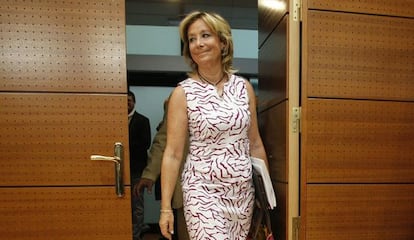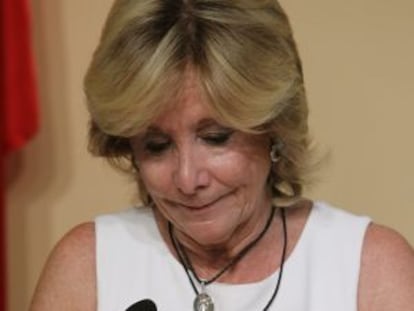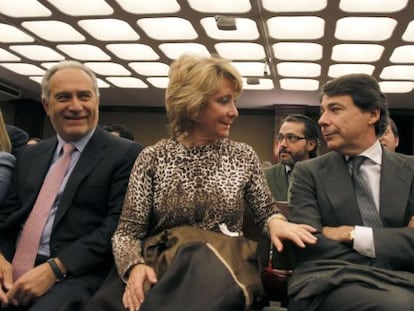Esperanza Aguirre: the career politician who could have had it all
The former regional premier from Madrid is bowing out from politics unscathed


Esperanza Aguirre is, above all else, a political animal and a survivor of the circles of power. She is a woman who has spent 30 years on the frontline of politics, from her ascent to the post of city councilor to her unexpected resignation on Monday from the premiership of the Madrid region, citing "personal reasons."
Possessing a great sense of political opportunism, a lot of character and a certain arrogance, Aguirre is a politician of ability, and she is genuine. She has never sought to please all of the people all of the time, and has always remained conscious of her debt to the far right elements of the Popular Party (PP), to whom she has never missed an opportunity to endear herself.
Without Aguirre, it is impossible to understand the recent history of the PP. Even one of her most direct rivals, Prime Minister Mariano Rajoy, said this week that Aguirre will remain "one of the greatest assets" of the PP, as much for her support during the 2008 party conference, that saw the prime minister sweep aside his rivals for the leadership, as for her policies in Madrid, which formed the nucleus of the government's austerity plan.
Aguirre has been a City Hall councilor, a minister, a senator, the first woman to preside over the upper house, a regional deputy and one of the few women to head a regional government. In the capital she will be remembered as the champion of recycling, the woman who took the Metro system to the furthest corners of the city, and, above all, someone who had the capacity to appear to invest in public services while at the same time dismantling a health and education system that worked well in order to create a huge, parallel private market.
While never admitting to it in public, Aguirre also harbored (and maybe still does) a dream of becoming Spain's first female prime minister. In one of the very few interviews she granted to EL PAÍS, she was quizzed on this ambition. Her response was a good snapshot of her idiosyncrasy.
A testing ground for liberal policies
Whether you want to prove that Madrid has been guided to higher levels of social wellbeing under Esperanza Aguirre, or demonstrate the complete opposite, there are figures to back up both arguments.
For example, unemployment in the region was four percentage points under the national average in 2003, and is now almost six percentage points lower. However, over the same period, per capita GDP has grown at a slower rate than the state average. The latest report on GDP growth published by the National Statistics Institute shows that in the past year Madrid ranked seventh, and was also the fifth region with fewest falls since the economic crisis began. In terms of per capita income, it ranked third behind the Basque Country and Navarre, with a median of 29,731 euros. Madrid officials, however, dispute the INE's methods of calculating this data.
Aguirre's mandate has also been unequal in economic terms. During her first term (2004 to 2007), the boom years, there was notable economic growth. It was the era when the former premier planned the construction of eight new hospitals and dozens of bilingual schools, while doubling the length of the capital's Metro tracks. At that time unemployment in Madrid stood at six percent. Now it is almost 19 percent.
Madrid in 2003 represented 17.7 percent of the national economy; nine years later it stands at 17.9 percent. It also has the lowest public debt of all of Spain's regions; 9.1 percent of GDP, compared to 14.2 percent on average. Catalonia's regional debt stands at 22 percent of GDP. Aguirre achieved this by creating new management formulas for public services, including awarding contracts based on an annual levy to avoid compromising regional debt.
Although the former premier has, on occasion, thrown her weight around to get her way -- such as when she applied pressure to savings bank Caja Madrid to install her erstwhile number two, Ignacio González, as its president -- she has also blazed a trail for liberal policies in line with her political Decalogue. Aguirre pushed for privatization, lowered taxes, farmed out services, railed against the civil service and labor union culture and liberalized the service industry, permitting Madrid's shops to open on holidays and encouraging the construction of large buildings.
Aguirre campaigned against the value-added tax rise brought in by the government of José Luis Rodríguez Zapatero and, when the crisis broke, was one of the first public officials to set measures in motion to bring down the deficit. Up until July, Madrid is second only to the Basque Country, which has special fiscal status in terms of its tax distribution, in staying within its budgetary forecasts. Furthermore, Aguirre's austerity policies in Madrid presaged those adopted by Mariano Rajoy at the national level.
"What a question! I can't answer that, because if I say no, well... and if I say yes, well... It's like the archbishop who arrived in New York and was asked straight away what he thought about the prostitutes. All to create the headline, 'The archbishop, as soon as he arrived, asked what was going on with the prostitutes'."
But Aguirre is not just a political survivor. She was involved in a helicopter crash, along with Rajoy, in 2005 and in 2008 escaped unscathed from the terrorist bloodbath in Mumbai. But Aguirre's real survival instinct is evident in the manner in which she emerged none the worse from the two most sordid episodes of her career: the so-called “tamayazo,” when two Socialist deputies were persuaded to change their votes to prevent Socialist candidate Rafael Simancas from forming a coalition government in Madrid; and the Gürtel corruption scandal, which sunk one of her right-hand men, Alberto López Viejo, who was responsible for organizing her public appearances and election campaigns.
She leaves behind her an indebted capital, with no capacity for investment whatsoever. What's more, the region is now in the hands of her uncharismatic number two, Ignacio González.









































